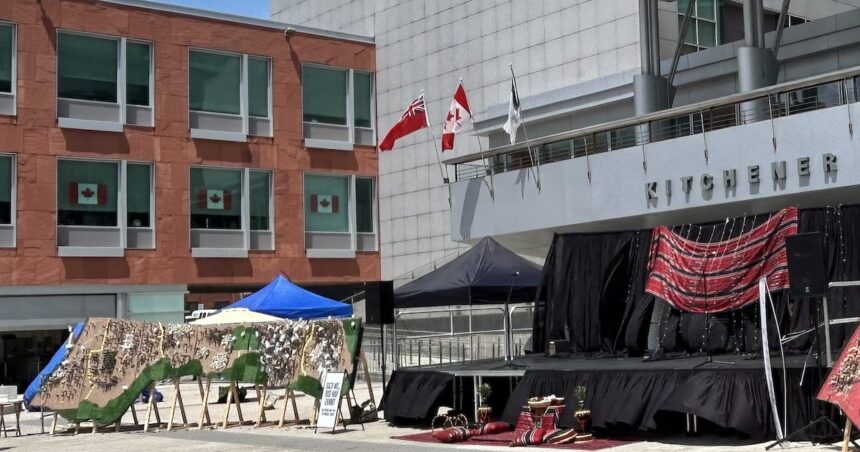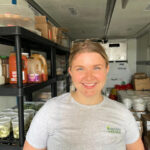The lawn at Victoria Park filled with families on blankets. Children’s laughter punctuated by the rhythmic dabke drums. The scent of za’atar and freshly baked bread drifting through the summer air.
These sensory moments captured the essence of Kitchener-Waterloo’s Palestinian Culture Festival last weekend, where hundreds gathered to celebrate Palestinian heritage through food, music, art, and community connection.
“We wanted to create a space where everyone could experience the beauty of Palestinian culture directly,” explained Leila Abdelrahim, one of the festival organizers and a long-time Kitchener resident. “There’s so much more to our identity than what appears in news headlines.”
The free community event featured traditional dance performances, cuisine from several local Palestinian-owned restaurants, and artisan stalls displaying handcrafted embroidery, ceramics, and olive wood carvings. Many items showcased the distinctive tatreez embroidery patterns unique to different Palestinian regions.
For Waterloo Region’s Palestinian community—estimated at over 5,000 people according to Statistics Canada‘s latest demographic data—the festival offered a moment of joyful cultural expression amid challenging times.
Ibrahim Mohsen, who moved to Kitchener from Gaza fifteen years ago, brought his children to experience traditions he feared might otherwise fade. “My kids were born here. I want them to feel connected to their heritage, to understand the richness of where their family comes from,” he said while watching his daughter learn embroidery techniques from elder women at the crafts table.
The event was particularly meaningful for younger generations navigating multiple cultural identities. University of Waterloo student Nour Khalidi helped organize a poetry corner where visitors could read works by Mahmoud Darwish and other Palestinian literary figures.
“Growing up here, I sometimes felt disconnected from my roots,” Khalidi shared. “Events like this help us maintain our cultural identity while also inviting our neighbors and friends to understand who we are beyond political narratives.”
Festival attendees represented the region’s diverse population. Kitchener resident Maria Lopez attended with her family after seeing promotions at the local library. “We’ve never tried Palestinian food before, and it’s been wonderful. The hospitality here is incredible—people keep offering us samples and explaining the ingredients and history behind each dish.”
Cultural education remained central to the festival’s mission. Interactive workshops taught visitors about the significance of olive trees in Palestinian culture, traditional farming practices, and the symbolism behind different regional costumes. A small museum-style exhibit displayed historical photographs and artifacts on loan from community members.
Dr. Samira Hassan, a cultural anthropologist at Wilfrid Laurier University, noted the festival’s importance extends beyond celebration. “Cultural festivals serve as living archives. They preserve traditions that might otherwise be lost to displacement and diaspora. For the Palestinian community specifically, maintaining cultural practices becomes an act of resilience and continuity.”
Local officials including Kitchener City Councillor Sarah Johnson attended, emphasizing the value of cultural exchange in strengthening community bonds. “Our city is enriched by the diverse traditions that each community brings,” Johnson remarked. “Events like this help build understanding and connection between neighbors.”
Funding for the festival came from a combination of community donations, local business sponsorships, and a grant from the Kitchener-Waterloo Multicultural Centre, which supports cultural programming throughout the region.
As the evening closed with a communal dabke dance that invited all attendees to join hands in the traditional line formation, the festival achieved what organizer Abdelrahim had hoped. “Today wasn’t about politics—it was about humanity, about sharing our traditions that have survived for generations despite incredible challenges.”
The organizers announced plans to make the Palestinian Culture Festival an annual event, with hopes to expand programming next year. They also highlighted upcoming cultural workshops at the Kitchener Public Library throughout the fall, where community members will teach Palestinian cooking techniques, language basics, and embroidery.
For many attendees, the festival offered a rare opportunity to experience Palestinian culture through direct engagement rather than media representation. As Waterloo resident Tom Chen noted while his children’s hands were being decorated with henna: “This is how we build understanding—by breaking bread together, by dancing together, by creating something beautiful together.”
As dusk fell over Victoria Park and families packed up their blankets, the festival had accomplished something meaningful—creating a space where culture could be celebrated, shared, and preserved for generations to come.






